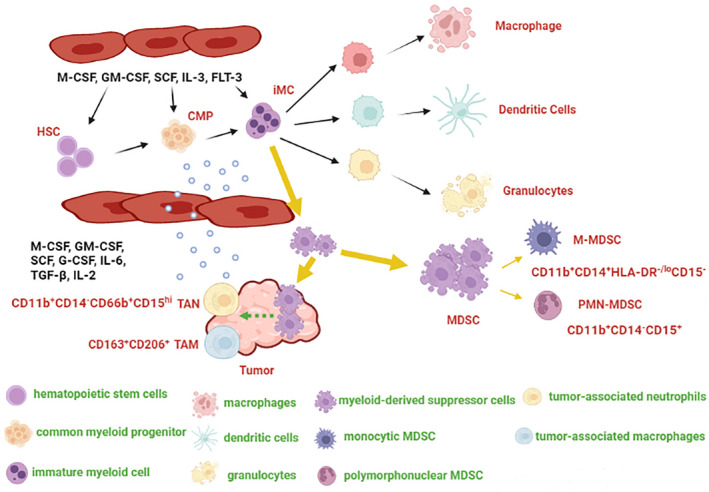Fig. 1.

Hematopoietic process in patients with solid tumors. Cancer patients secrete various cytokines in large quantities, including granulocyte colony stimulating factor (G‐CSF), granulocyte and macrophage colony stimulating factor (GM‐CSF), macrophage‐colony stimulating factor (M‐CSF), and so on. Generally speaking, these cytokines promote the differentiation of hematopoietic stem cells (HSCs) into immature myeloid cells (iMCs), and then further differentiate into immune cells such as macrophage, dendritic cells (DCs), and granulocytes. However, the normal differentiation of HSC is blocked in patients with solid tumors, and iMC mainly differentiate into myeloid‐derived suppressor cells (MDSCs) rather than normal immune cells. In addition, MDSC is recruited by tumors and induces the production of tumor‐associated macrophages (TAMs) and tumor‐associated neutrophils (TANs), thereby promoting the formation of the tumor immunosuppressive microenvironment. CMP, common myeloid progenitor; PMN‐MDSC, polymorphonuclear myeloid‐derived suppressor cells; M‐MDSC, monocytic myeloid‐derived suppressor cells; SCF, stem cell factor; TGF‐β, transforming growth factor‐β; IL‐2, interleukin‐2; IL‐3, interleukin‐3; IL‐6, interleukin‐6; FLT‐3, fms‐like tyrosine kinase‐3. [Colour figure can be viewed at wileyonlinelibrary.com]
